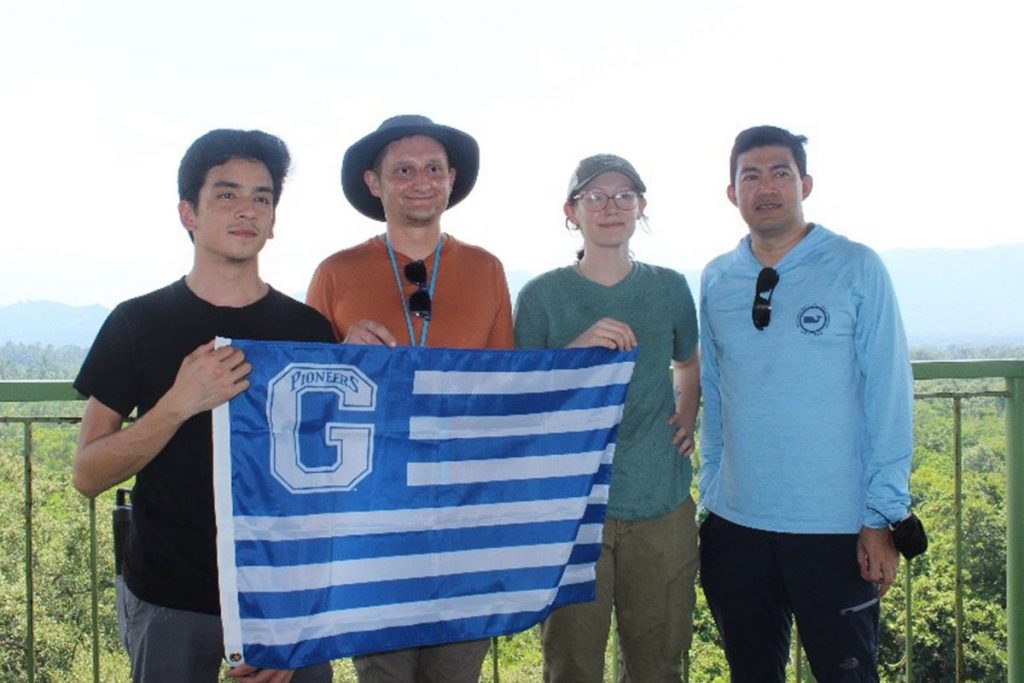Above: This summer, a group from Glenville State University that included (l-r) Adem Hupp, Corey Foster, Ciera Heine, and Dr. Rico Gazal traveled to the Philippines to conduct field research as part of an ongoing exchange program with the University of the Philippines Los Banos. (Courtesy photo)
This summer, three Glenville State University students and a faculty member traveled to the Philippines to conduct field research as part of an ongoing exchange program with the University of the Philippines Los Banos College of Forestry and Natural Resources (UPLB CFNR).
The Glenville State delegation included Dr. Rico Gazal and students Ciera Heine, Corey Foster, and Adem Hupp. Their trip focused on conducting research on plant diversity and invasive species in the tropical rainforest.
“We were able to accomplish the tree diversity research by joining the research team of the Makiling Center for Mountain Ecosystem in remeasuring DBH [the measurement at which tree diameter is typically measured, referred to as “diameter at breast height” or simply “DBH”] and height of trees found on the Long-Term Ecological Research plots at Mount Makiling. The permanent plots are remeasured every five years to determine plant growth patterns and forest dynamics. The students also conducted a plant eco-physiological measurement (chlorophyll and stomatal conductance) of native and invasive vines in the Makiling Botanic Gardens. They found that native vines had significantly higher chlorophyll content, but lower stomatal conductance compared to the invasive vines. A high rate of stomatal conductance provides the invasive vine the ability to open their stomata at a higher rate throughout the day for gas exchange which translates to their prolific growth and dominance in the forest area,” Gazal said.
The group was able to reconnect with Dr. Rogelio Andradra, Professor and Superintendent of Makiling Botanic Gardens, and Forester Leilanie Castillo, Head of the Division of Watershed of Makiling Center for Mountain Ecosystem, UPLB CFNR, during their trip. Andradra and Castillo had visited Glenville State’s campus in the spring to give presentations and guest lectures. They also helped coordinate much of the itinerary for the Glenville State students during their visit.
Heine, Foster, and Hupp gave presentations at UPLB CFNR and Southern Luzon State University (SLSU) on the different natural resource industries in West Virginia such as energy (oil, gas, coal, hydrology, and wind energy), forestry, and ecotourism. These presentations provided the opportunity for the students to interact with students and faculty from each academic institution through an open forum and discussion on natural resource management.
“The trip was an incredible experience. The Filipino people were very welcoming and hospitable – we never went hungry while we were there. Everywhere we went, we were graciously served delicious homemade local cuisines. Getting to conduct research in a rainforest and mangrove was extraordinary. I’m so thankful that this opportunity was provided to me. To be fully immersed in another culture on the other side of the world was truly an unforgettable experience,” said Foster.
“The trip to the Philippines this summer has opened my eyes to the difference in how forestry is treated all around the world. I’m thankful for both Dr. Andradra and Ms. Castillo for their hospitality and all the wonderful opportunities they gave us while we visited the Philippines. Lastly, I’d also like to thank Dr. Gazal for all the work he did to get us to the Philippines, and allowing me to be one of the three students to visit,” said Hupp.
“The trip was both academically and culturally educational. I met a lot of great people and learned a lot from each of them. I encourage everyone to get outside of their comfort zone and travel while in college,” Heine said.
The Glenville group also visited different research, academic, and government institutions and were able to take several cultural tours of the area.
“I think the students gained new perspectives on natural resource management in the tropical rainforests and we also strengthened our partnerships with both UPLB CFNR and SLSU for faculty, research, and student exchanges,” Gazal added. He plans to take another group of students to the Philippines for a similar research opportunity again next summer.
